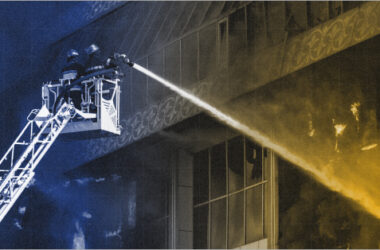Fire incidents can be devastating, causing significant financial losses to individuals and businesses alike. To mitigate the risks associated with fire damage, insurance plays a crucial role. In India, where fire accidents are not uncommon, Fire Insurance Policies provide financial protection against the perils of fire-related incidents. Different types of fire policies are designed to safeguard assets and provide peace of mind to policyholders.
Understanding the different types of Fire Insurance Policies available in India is essential for individuals and businesses seeking comprehensive coverage. Each type of policy offers specific benefits and caters to varying needs, ensuring that policyholders are adequately protected in the event of a fire. In this article, we will look into various types of Fire Insurance Policies offered in India. After going through this article, readers will be able to make informed decisions when selecting the most suitable policy for their specific requirements.
Here we go!
Different Types of Fire Insurance Policy in India
In India, there are different types of Fire Insurance Policies available to cater to the diverse needs of individuals and businesses. The main types of Fire Insurance Policies in India include:
- Valued Policy: The value of a subject matter is determined under a Valued Policy. The insurer compensates a predetermined amount based on this value if the subject matter is destroyed or damaged. This policy does not operate on the indemnity principle. The agreed-upon value for compensation can be greater or less than the market price. This insurance is intended for commodities and properties whose exact value cannot be determined following damage or loss. This category typically includes works of art, jewelry, paintings, and crafts.
- Specific Policy: This policy pays up to the specific amount of the risk mentioned in the policy. In the event of a fire, the insurer will pay for losses that are less than the specified amount or up to the sum insured. Assume a policy is purchased to insure a property valued at Rs. 80,000, with a sum insured of Rs. 50,000. When the property suffers a loss of Rs. 40,000, the insurers pay the entire amount. The entire sum would be paid if the loss is up to Rs. 50,000. However, if the loss exceeds Rs. 50,000, the insurer will pay only up to the amount insured. However, the insured is not penalized for purchasing insurance for a lower amount because the value of the property is not considered.
- Average Policy: When an average clause applies to a fire policy, it is referred to as an Average policy. This clause is put in place to penalize the policyholder for picking up a policy for less than the property’s true value. If the policy value is less than the insured property, the payout amount is lowered proportionally. Assume you have Rs. 20,000 in Fire Insurance and your property is worth Rs. 30,000. In the event of fire damage totaling Rs. 50,000, the insurer will pay you up to Rs. 10,000 ( or 20,000/30,000 x 15,000) only. It discourages policyholders from purchasing an undervalued policy.
- Comprehensive Policy: A comprehensive policy protects the insured against fire, explosion, lightning, burglary, rioting, labor disturbances, and other perils. Because a single policy covers various risks, a comprehensive policy is strongly advised.
- Floating Policy: This policy is designed specifically for import and export business owners. The floating policy is used to cover an organization’s goods that are scattered across the country, so long as the goods belong to a single owner. The premium charged is equal to the average premium that would have been charged if a specific policy for all of these commodities had been taken up. The insurer may include its own terms.
- Replacement Policy: In this policy, the insurance providers assure compensation for loss based on the market value of the property. As a result, the amount to be reimbursed is computed after taking into account the property’s depreciation. The policy guarantees that the reimbursement will be based on the replacement cost. As a result, the new asset will cost the same as the old one. Because the compensation is based on the market value of the new assets, it is replaced at no additional cost.
- Consequential Loss Policy: Usually, factory operations get halted due to a fire. Despite the fact that fixed expenses remain constant, production declines. All of these losses can be covered by a consequential loss policy. This policy compensates the policyholder for loss of profit by calculating compensation based on the loss of sale.
- Declaration policy– When stock values/stocks fluctuate often, this type of strategy is useful to avoid underinsuring. According to the agreement between the insurer and the insured, stock values must be declared on a regular basis, such as monthly. The premium is computed based on the average stock values at the conclusion of the policy year. Any excess premiums are reimbursed to the policyholder.
The factors that determine the appropriate policy to be purchased
The following factors usually come into play while deciding on the appropriate policy to be purchased-
- The type of risk involved.
- The property’s contents.
- The nature of the insured property.
- Exposure hazards.
- Occupancy hazards
Who needs Fire Insurance Policy?
Fire Insurance is typically meant for:
- Owners of Buildings and Contents: This includes individuals, institutions, firms, or organizations that own property such as residential or commercial buildings, along with their contents such as household articles and furniture.
- Godown Keepers and Shopkeepers: Those who own or manage warehouses (godowns) or retail shops may also opt for Fire Insurance to protect their inventory and property from fire damage.
- Educational Institutions, Research Institutions, Banks, Trusts, Charitable Institutions: Any establishment falling under these categories may opt for Fire Insurance to safeguard their buildings, equipment, and other assets from fire-related risks.
- Hospitals, Hotels, Clinics, Lodging and Boarding Centers: Service providers in the hospitality and healthcare sectors may choose Fire Insurance to protect their premises, equipment, and other assets from fire damage.
- Manufacturing Firms, Industrial Entities: Industries and manufacturing units often opt for Fire Insurance to protect their factories, machinery, raw materials, and finished goods from fire hazards.
- Transporters: While primarily associated with property, Fire Insurance Policy may also extend to cover vehicles, cargo, and other assets belonging to transporters, protecting them from fire-related risks during transit or storage.
In essence, Fire Insurance Policy is designed to mitigate financial losses or damages caused by fire for a wide range of individuals, institutions, firms, and organizations across various sectors.
Under a Fire Insurance Policy, the following circumstances are typically covered:
- Damages Caused by Fire: This is the primary coverage, encompassing damages resulting directly from fire.
- Lightning: Damages caused by lightning strikes leading to fires or other forms of property damage.
- Explosion/Implosion: Coverage for damages caused by explosions or implosions, whether accidental or intentional.
- Storm, Typhoon, Hurricane, Tornado, Flood, and Inundation: Damage caused by natural disasters such as storms, floods, and similar events.
- Riot, Strike, Malicious Damage, Aircraft Damage: Protection against damages caused by civil disturbances, malicious acts, or accidents involving aircraft.
- Missile Testing Operations: Coverage for damages resulting from missile testing activities, including accidental explosions or impacts.
- Impact Damage: Damages resulting from the impact of vehicles, falling objects, or other forms of physical impact.
- Bursting and Overflowing of Water Tanks, Apparatus, and Pipes: Coverage for damages caused by the bursting or overflowing of water-related installations.
- Subsidence and Landslide, including Rockslide: Protection against damages resulting from the sinking, shifting, or collapse of land.
- Bush Fire: Coverage for damages caused by fires in vegetation, forests, or bush areas.
- Leakage from Automatic Sprinkler Installation: Damages resulting from leaks or malfunctions in automatic sprinkler systems installed for fire protection.
These coverages provide comprehensive protection against a wide range of perils that can result in property damage or loss due to fire or related events.
Steps Involved in Fire Insurance Policy Claim
Loss estimation
Intimate the insurance provider/direct broker
File a claim with the direct broker
Claim assessment and loss valuation
Review of policy
The footnote:
In a country like India, where fire incidents can cause substantial financial losses, having the right Fire Insurance Policy is crucial.
In the discussion above, we tried to explore the various types of Fire Insurance Policies available in India, aiming to equip readers with the knowledge needed to make informed decisions. By making informed choices and securing comprehensive coverage, you can gain peace of mind, knowing that your assets are safeguarded and your financial well-being is protected in the event of a fire-related incident. Remember, prevention is always better than cure, and maintaining adequate fire safety measures, alongside having the most-suited insurance coverage is crucial for your business.
Frequently Asked Questions (FAQs)
- What is covered in a Standard Fire and Allied Perils Policy?
Under the “Standard Fire and Allied Perils Policy”, also known as SFSP, the following hazards are covered:
- Fire
- Damage to aircraft
- Strike, riot, and malicious damage
- Lightning
- Implosion/Explosion
- Storms, tempests, tornadoes, typhoons, floods, cyclones, hurricanes, and inundations
- Landslide and subsidence
- Impact damage
- Tanks, apparatus, and pipes burst or overflow.
- Automatic Sprinkler Installations leakage
- Testing operation of missiles
- Fire spreading out of the bushes.
Additional covers can be added to the SFSP policy by endorsement and by paying additional premiums.
2. What are the things to consider while purchasing Fire Insurance Policy for my business?
You may consider the following points-
- The value of your building and contents
- The type of business you have
- Your area/location
- The deductible
- The limits of the policy
3. How to Make a Claim on Your Fire Insurance Policy?
If your business suffers damage from a fire, you will need to make a claim on your Fire Insurance Policy. The following points will help you ease through the claims process:
Be in touch with your insurance provider regularly and check on your claim status.
Contact your insurance agent or broker as soon as possible after the fire. They will help you initiate the claims process.
Gather all the documents you may need to support your claim, including pictures of the damage, receipts for any repairs/replacement of the damaged items, and reasonable estimates for repairs.
Be prepared to answer queries about the cause of the fire and the steps taken by you to prevent fire incidents in the future.








